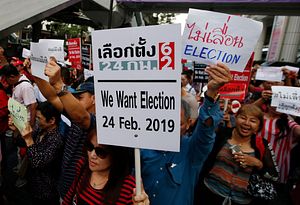As in previous cases, the confirmation of Thailand’s new election date of March 24 – the first polls held since a junta-led government took over the country in May 2014 – has generated no shortage of headlines about what this could potentially mean for the country. Like in other cases in Southeast Asia and beyond, while the holding of elections is no doubt an important step in the country’s restoration to democratic rule, it is important to keep in perspective what elections can and cannot do for the country as it seeks to address its broader and deeper political challenges.
The designation of Thailand as a “democracy” in terms of regime type and the focus on contemporary developments such as the May 2014 coup that brought the current junta-led government to power can obscure the more complex realities in the country’s politics. In fact, Thailand has been no stranger to democratic disruption and political instability. Following the establishment of democracy after centuries of monarchy in 1932, Thailand has had 19 attempted coups (12 of them successful) and 20 constitutions, which is an average of one of such changes in just over four years. More fundamentally, these coups, constitutional changes, and other markers of regime transition have masked wider and more fundamental political struggles at play.
That’s true of the 2014 coup as well. While it was no doubt a serious setback for democracy, it was also the symptom of a longer-term struggle between that dates back to 2001, when the populist forces that brought then-prime minister Thaksin Shinawatra to power were at odds with the older elite establishment comprising the military, monarchy, and bureaucracy, amid other longer-term structural changes in Thai politics and wider society as well. Since a 2006 coup that overthrew Thaksin, Thailand has attempted to ease these tension through three elections – in 2007, 2011, and 2014 – but those elections have failed to do so. Indeed, ahead of the coup in May 2014, the country was in such a prolonged state of political paralysis that some had expected a sort of military intervention at some point.
So, given all this, what can the upcoming election, if and when it is held, do for Thailand? On the one hand, the election – which comes nearly five years after the 2014 coup and after repeated postponements – is one potential step towards democratic restoration that has proven elusive for the country for too long. The ruling junta has been struggling with a range of legitimacy concerns throughout its time in office, and continued rule at the helm and suppression of other political voices has arguably not only postponed, but exacerbated divisions. Furthermore, irrespective of the complexities of Thailand’s domestic politics, certain international actors including the United States simply cannot engage with Bangkok as much it otherwise can with a full transition back to democracy, so that could also potentially ease some of Thailand’s foreign policy challenges, even if they may create additional complications in other areas.
But beyond that, it is unclear exactly what else elections would do. For one, the junta and other political forces have gone out of their way to change the rules of the game to circumscribe the range of possible political outcomes, increasing both the likelihood of a result favorable to them but also raising the risk of opponents discrediting them and then choosing to pursue non-democratic means to address their concerns. For another, in the five years since the coup, there has been some additional uncertainty that has arisen with respect to other political variables, including the death of revered monarch Bhumipol Adulyadej in 2016, the rise of newer political parties, and the building up of frustration over years of a junta-led government.
Elections in Thailand, if and when they are held, are a necessary step to help manage these uncertainties, but they will be far from sufficient. History also suggests that they will be a small step to deal with these broader and deeper challenges rather than a final destination of some sort, and that far from the extremes of a dreamlike state of democratic stability and a nightmarish political unraveling, the path the country has ahead of it will be a much more complicated and meandering one that defies simplistic narratives and litmus tests.

































